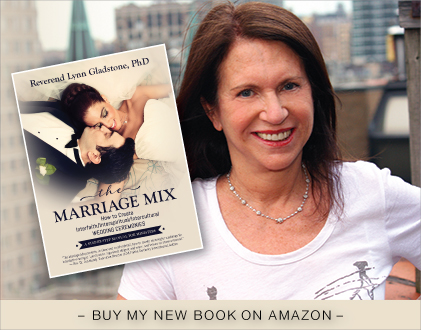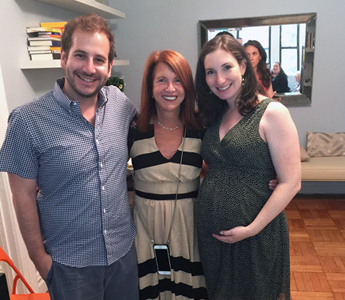In the following online article Rev. Lynn Gladstone is interviewed by the author of the article, Rachel Torgerson, for the Knot.
More and more couples are describing themselves as “spiritual and not religious,” but their families still have some faith-based requirements for the ceremony. Not sure how to reconcile those two opinions? Here’s how to deal.
If you’d describe yourself as “spiritual and not religious,” you’ll probably find yourself in the majority of couples these days, according to some interfaith premarital counselors and wedding celebrants we talked to recently. It actually seems like most of the time, if couples are discussing religion at all, it’s because their parents are more traditional (and oftentimes are the ones footing the bill), and they want to honor them and their upbringing in one of the most important moments in their lives. If that sounds like you, and you find yourself a little at odds in your belief system with your parents, you may be about to enter into a lot of heated discussions with your parents and even your fiance about what readings are most important to you, and what types of vows you should say, for example. Don’t sweat it — we have four pretty foolproof ways to keep the peace and make sure everyone is on the same page when it comes to religion, family and the ceremony that represents you as a couple.
1. Understand your own beliefs as a couple, then find common ground with your parents.
Set the ground rules for your ceremony. In order to do this, you have to understand what you both want to believe as a couple. There are some simple questions your officiant will give you to help you get to the bottom of this. “The most important conversation the couple needs to have is if God [or any other entity] is ‘invited’ to the ceremony at all,” says Lynn Gladstone, an interfaith officiant and premarital counselor. If not, are you still open to Biblical or other religious passages? Determining what you want to believe as a couple is one of the most important aspects and will form the foundation of your ceremony, not to mention your marriage.
But one thing that’s worth noting, as we’ve mentioned above, is that religion seems to be an issue that concerns your parents more than you two a lot of times. “Many couples are not terribly strict themselves, but have parental or family issues to deal with. I always advise them that while being sensitive to family wishes, it is ultimately their wedding and they must be true to each other and themselves,” says David Didio, officiant and premarital counselor. But a good way to make sure things don’t blow up just before the wedding, says New York City wedding celebrant Tulis McCall, is to have your officiant chat with your parents to get everything on the table. “Oftentimes I interview the parents also, just to let them know what I’m doing and ask if they have anything in mind for the ceremony,” she says. “Most couples really do want to honor their parents.”
2. You can customize your ceremony to be inclusive of everyone.
It’s easy for your officiant to include important readings, songs and poems from whatever source you deem powerful, whether it’s secular or spiritual. Just as you can write your own vows, you can customize your entire ceremony with your officiant to include anything you want — from a meaningful Biblical passage and other religious texts to sonnets, song lyrics or prose. Whatever you imagine is possible, as long as you bring it up in your sessions with your officiant or celebrant. The biggest thing to remember, Gladstone says, is to not intentionally hurt people attending the wedding. “If it’s going to devastate a Catholic grandmother if you don’t mention scripture at all, is that really worth it?” she asks.
3. Couples are taking bits from both religions and making their own belief systems.
Not only are couples customizing ceremonies, they’re mixing and matching the things they like best out of both religions they ascribe to (or any religion at all). “I have found my frame of reference is that the world, in terms of religion, is going through a big shift,” Gladstone says. “When people come to me, across the board the issue of being different religions is not very big. I have yet to have a couple who says their families have a problem with the two of them getting married.” But when it comes to adding a bit here and there, it’s good to set parameters so you’re managing your parents’ (and families’) expectations. “I think you need to have a discussion with [family members], telling them that you want them to be happy, but it is your day. Tell them to write down the most important things to have in the wedding and pick your top three or five and honor them. It’s about setting boundaries, but having respect,” Gladstone says.
4. You can have two different ceremonies — if you want.
Parents not budging on what they want? That’s really okay. We’ve seen more than enough dual ceremonies to know it’s most certainly a thing. Many couples of different religions choose to have two separate ceremonies, if both faiths are important to them. We have tons of couples in our real weddings who have had two ceremonies — one for one religion and another for the other. If you have the budget to cover it, and you’re dead-set on doing a double ceremony, it’s definitely not unheard of.
If religion is deeply meaningful to you, then of course you should have a religious ceremony full of the things you find special within your faith. Just make sure you and your partner have discussed how much it means to you. “It’s really about communication and compromise,” Didio says. “It’s important to discuss these issues far in advance of the wedding planning process, so that when the time comes to work with the ceremony officiant, the couple is clear on where they have issues to be resolved, and what they’ve already worked out.”
Article Above by Rachel Torgerson for the Knot
-Rev. Lynn






